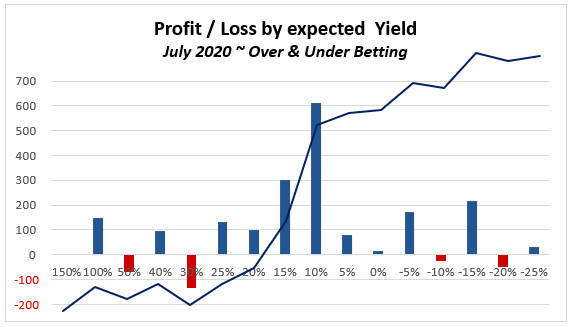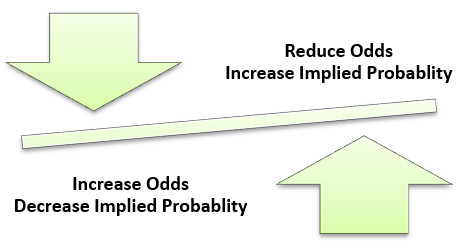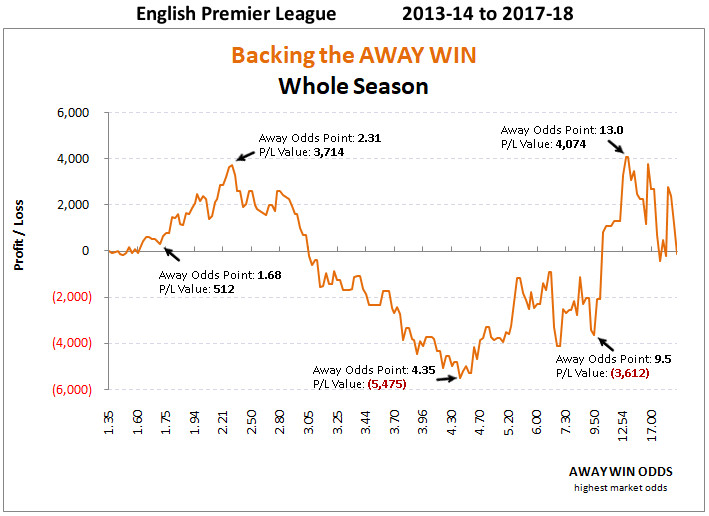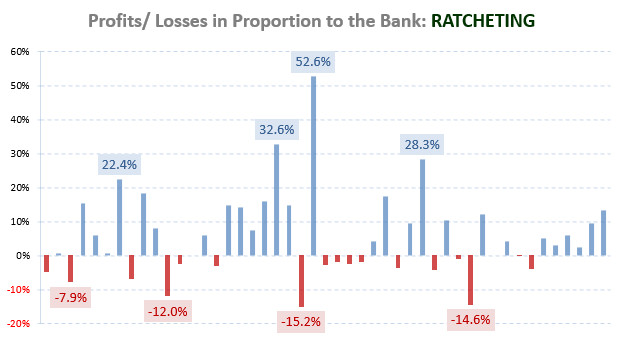
The answer to this question is unequivocally YES and only in rare or extenuating circumstances are odds in betting exchanges priced less than with a bookmaker.
The reason is simple: If the ‘back’ price for an event with a bookmaker is higher than the ‘lay’ price in a betting exchange the opportunity of an arbitrage transaction becomes possible.
This simply means that by ‘backing’ the outcome with the bookmaker and immediately placing a counter bet in the betting exchange (a ‘lay’ bet), risk-free profit can be generated from the event no matter what the outcome.
Since there are now many software applications which automatically monitor price fluctuations in the markets and immediately react (and much faster than a mere mortal can type the word Betfair or Betdaq into their browser window), prices in betting exchanges are ‘by definition’ higher than at bookmakers.
Only in fringe markets and/or those with low liquidity (i.e. not frequented by bots), does it sometimes occur that a bookmaker temporarily offers a better price than in a betting exchange. However, in these cases arbitrage is rarely viable because of the difficulty in getting a lay bet matched in a stagnant market.
How are prices set at betting exchanges?
Prices on the betting exchanges always ‘follow’ the prices of the bookmakers. There is no other way purely because arbitrage opportunities would immediately open up should anyone be foolish enough to offer a bet at a lower price than the best bookmaker’s offer.
Compiling odds works as follows:
Large bookmakers have their own analysts departments; smaller bookmakers use the services of odds compiling bureaux. There are hundreds of mathematicians and statisticians employed to calculate bookmakers odds. The calculations are performed using statistical and mathematical methods such as those described in this blog and especially Soccerwidow’s Fundamentals of Sports Betting.
Depending on the popularity of a match and the expected demand for bets that it will create, bookmakers publish their odds in plenty of time before the game. Smaller leagues have a lead time of approximately one week or so; bets on more prominent matches are often published a whole month in advance and sometimes even earlier.
Betfair opens up its markets around a week before kick-off and if you have time to check the virgin markets, you will find them completely empty, without any back or lay-offers. As a rule, betting exchange markets ‘wake up’ about 2 days before kick-off. Before this time, professional market traders are busy with other things.
 Image: Dragana Gerasimoski (Shutterstock)
Image: Dragana Gerasimoski (Shutterstock)The first people to offer bets on the betting exchanges are the ‘Arbers’. The odds they offer for backing outcomes are generally far below the bookmaker prices. Lay odds are also extremely excessive. In ‘Betfair speak’, at this stage there are many ‘ticks’ between the back and lay prices.
Only about 24 hours before kick-off do back and lay prices close-up to each other. The situation is often then just the one necessary ‘tick’ between the back and lay prices. This does not necessarily mean that any bets have been matched, but more that the market has ‘settled’.
Serious price fluctuations are not expected until 2-3 hours before kick-off and hit their peak activity in the hour before the start when team news is made public. The ‘bookmakers margin’ (overround) evaporates and the odds in the betting exchanges are now likely to be considerably higher than the odds of the best bookmakers.
Are Betfair’s prices ‘fair’?
The prices on betting exchanges do not necessarily reflect the true probabilities (= expected outcomes). They are certainly ‘fair’ in relation to the prices in the market, but inevitably do not represent the true zero odds. They are often close, but not always.
The reason for this is that bookmakers set their prices taking into account the expected demand and odds at betting exchanges follow bookmaker prices (as explained above).
For example, bookmakers have the habit of under-pricing emotionally favoured or heavily supported teams, whilst underdogs are often offered at odds which are far too high. However, beware! This example is a very, very rough rule of thumb. Ultimately, it is always necessary to recalculate all odds yourself.
Summary
At betting exchanges you will find higher odds almost without exception. The overround is no longer part of the equation, and betting exchange odds cannot be lower than bookmaker odds due to arbitrage.
Betting odds at betting exchanges do not necessarily represent ‘true’ probabilities (= expectations) because prices at betting exchanges follow bookmaker odds, which in turn are ‘profit-optimised’ in their favour.
We hope you now understand the pricing mechanism in the market a little better and it would be great if you would leave a comment.








It’s interesting how the legacy of the traditional Bookmaker lives on when superior odds are offered at the exchanges, or Pinnacle.
I think the main reason punters continue to use standard ‘soft’ bookmakers is because they invest so heavily in branding and promoting their services. Many punters simply don’t look elsewhere. After all, their higher margins mean they can afford to invest in advertising.
Also worth noting is that most bookmakers (in the UK, at least) also leveraged from their legacy of traditional shop bookmaking (which still exists). Long before the internet, they built up their reputation and client base. Naturally, the public recognises the brand and sticks to what they know…
Hi Toby,
Yes, it is possible to find more advantageous odds at betting exchanges but they are never best odds on every event.
Exchange prices are driven by odds movements in the bookmaker market and all prices, whether at an exchange or a bookmaker, react to customer demand for those odds – in other words, the weight of money being placed on events determines how the odds move as the bookmaker seeks a measure of parity in balancing its book.
In less popular leagues, exchange prices generally offer less benefit than those with the bookmaker. Of course, exchange prices also include commission, which can have a serious detrimental effect on profits, even at relatively low levels: e.g. 5% (Betfair) and 2% (Smarkets).
Bookmakers set the market opening prices based purely on historical statistics and an anticipation of public perception about the event in question. The opinion of punters on the exchanges then tends to follow this lead. Without the professional setting and guidance of bookmakers’ opening odds, I daresay the exchanges would have a more ‘Wild West’ feel about them.
Thanks for the good points in your comment.
Sure, your answer is right. But I have a question, when the odds offered by the bookmakers is lower than the betfair, the bookmakers can also take action to make a arbitrage—-go short in the bookmaker system and go long in the betfair. Why does the bookmakers do not take advantage of this arbitrage? is it because that if doing so, it will also affect bookmaker’s own balanced “book” or because bookmakers have liquidity problem—-bookmakers can not find enough bettors with whom they can go short?
Thanks.
Hi Robert,
Although the term “bookmakers” refers to one particular industry, there is not one business exactly like the other.
As an analogy… if you refer to the industry “computers”, you would refer to a very specific market, but everybody is certainly aware that Apple’s business model is totally different to Microsoft’s, and so on.
Hi! I dont speak english neither german so I have to use the google’s translator:
As for what you posted in this article, how does support the idea that the market shares offering odds are not best suited to reality with the idea of perfect markets telling us that the market absorbs all information available?
Thank you.
The concept that the market is very large and therefore it absorbs all information available is quite logical, but I don’t really understand your question.
The article is about the fact that odds at betting exchanges are generally higher than with bookmakers because otherwise there would be immediately arbitrage opportunities open up. Where do you see here a contradiction to the concept of perfect markets?
Indeed, these odds seem better but if you calculate the fee and taxes for deposit and withdrawal, they do not seem so attractive.